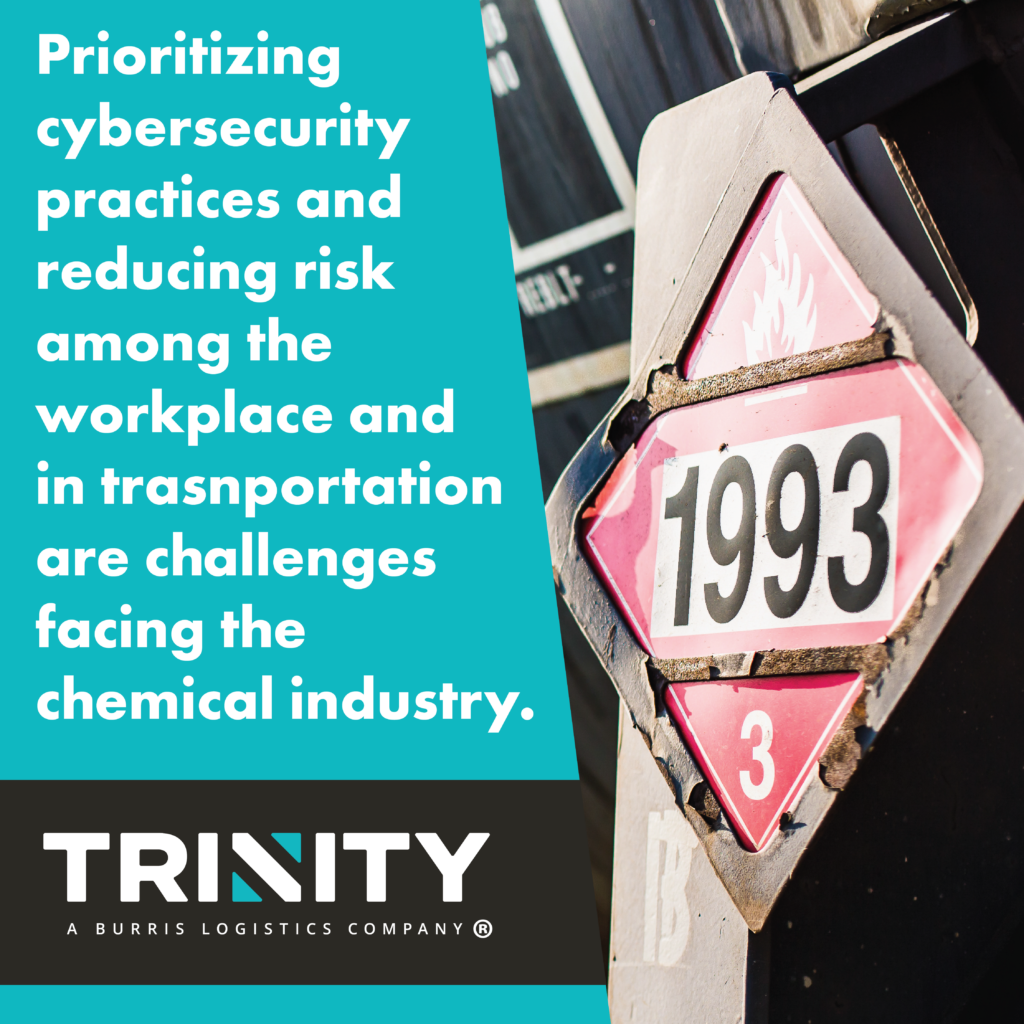The chemical industry is vital in producing goods and services that touch every aspect of our lives. It’s a competitive market to be in.
Adapting to trends is crucial for chemical manufacturers to stay successful. The most profitable companies will be ones that work with business partners who keep them updated on these trends and embrace any changes that may come their way.
Trends Affecting the Chemical Industry
- Artificial intelligence
- Data analytics
- Specialty chemicals
- Sustainability
- Renewable and bio-based chemicals
- Safety and reducing risk
- Resilient supply chains
Embracing Artificial Intelligence
The chemical industry has a history of embracing new technologies. Artificial intelligence (AI) is no exception. AI offers many potential benefits for chemical manufacturers. It can help find savings, improve efficiency, and increase productivity. There are so many ways AI can help chemical companies get ahead.
For example, it can help automate manual tasks and analyze vast amounts of data faster. With AI, chemical companies can make more informed decisions and improve quality control. Adopting AI can also help chemical companies improve workplace safety and reduce the risk of human error.

The Growing Significance of Data Analytics
Examining data sets for insights to improve decision-making is becoming more commonplace among chemical companies. Chemical manufacturers can use data analytics in their decision-making to enhance their productivity, reduce costs, and predict critical events that may impact their business. Moreover, they feed AI algorithms this data to forecast better and optimize their operations.
Accessing data can provide insight into the quality control of products or visibility into bottlenecks affecting their chemical supply chain. This data can help them pivot and improve their customer’s experience. Using data analytics is a great opportunity for chemical manufacturers to drive growth and profits.
A Rising Demand for Specialty Chemicals
Many other industries use specialty chemicals, like personal care, electronics, packing, and pharmaceuticals. In fact, the pharmaceutical industry accounts for the largest segment using them as the need for more medication grows.
Additionally, agrochemicals are another significant user of specialty chemicals. The growing population means an increased need for food and food production. Agricultural land is dwindling, and increasing the crop yield per acre of land becomes more important, increasing the demand for specialty chemicals.
Sustainability
The pressure on chemical manufacturers to reduce the environmental impact of their operations and products has never been greater. Regulatory agencies have placed stringent regulations with ambitious emission reduction goals for 2030. While many in the chemical industry have prioritized sustainability in their business, there is still work to do.
Green chemistry is part of this trend that’s gaining momentum. Green chemistry focuses on the processes and products to reduce the effect of hazardous materials and negative environmental impact while conserving natural resources for future generations. Green chemistry embraces recycling technologies, alternative energy resources, and other sustainable practices. This pushes many chemical manufacturers to review their current business strategies.

A Greater Need for Renewable and Bio-based Chemicals
A growing demand for renewable and bio- or plant-based chemicals should be no surprise.
This trend aligns with sustainability goals and brings the chemical industry opportunities for savings and new market opportunities. Companies are exploring avenues like synthetic biology, bioremediation, and the production of bioplastic or biodegradable materials
Prioritizing Safety and Reducing Risk
Safety and mitigating risk are huge concerns for businesses in the chemical industry.
Cybersecurity is a rising trend and threat for many companies. We see it all over the news. Hackers and scammers are becoming more tactical in cyber-attacks and company breaches of private information. It’s crucial for chemical companies to put in place security measures and training to keep their businesses safe.
The transport of hazardous chemicals has also recently gained special attention in the news. Rail transport accounts for around 19 percent of chemical shipments. Recent derailments, like in East Palestine, Ohio, have raised concerns about transportation safety.
Many chemical companies are also investing more in developing safer chemicals and products. Their concerns are not only to be less harmful to the environment but to human health as well.
Improving workplace safety is another concern. Companies install new safety protocols, enhance employee training, and use technology to address this.

Building a Resilient Supply Chain
In the last few years, companies realized how vulnerable their supply chains were.
In a survey by the American Chemical Council, 97 percent reported modifying operations due to supply chain disruptions. Chemical companies are focusing on reducing supply chain risk and increasing flexibility. With 25 percent of the U.S. economy depending on the chemical industry, it’s important their supply chains keep moving.
Keep Your Chemical Supply Chain Ahead of the Trends
Keeping your chemical company ahead of evolving trends and the competition is important. Having business partners that stay tuned to what’s happening in the chemical industry can be invaluable.
Trinity Logistics can help you with many of these trends through our services. Whether you have sustainability goals, are looking to build supply chain resiliency, or need technology to improve visibility and offer data analytics, we have solutions.
We’re members of many industry-related associations like the National Association of Chemical Distributors (NACD) and are Responsible CareⓇ Certified, so you don’t have to worry about falling behind in news or trends that may affect your business. When you work with Trinity Logistics, your designated expert will keep you so informed that you’ll likely know what’s affecting the chemical industry before any of your competitors do.
That’s just part of Trinity’s People-Centric service you’ll get to experience when working with us. We understand that people are at the heart of all businesses, so that’s who you’ll talk to – a dedicated relationship at Trinity. It’s also who we truly serve – your people.
Our goal is to improve lives, and when you decide to work with Trinity Logistics, you’ll see just that – improved life satisfaction amongst your employees and customers.
I’D LIKE TO DISCOVER HOW TRINITY IMPROVES CHEMICAL SUPPLY CHAINSThe chemical industry faces challenges such as volatile raw material prices, shortages, supply chain disruption, and more.
The chemicals industry is one of the most important sectors, with 96 percent of all manufactured goods depending on them. With many moving parts and various stakeholders involved in the chemical supply chain, there are several challenges this industry faces. Here are some of the biggest challenges affecting the chemical industry.
CHEMICAL INDUSTRY CHALLENGES
- Managing Raw Materials
- Transportation Disruptions
- Regulations
- Large Amounts of Data
- Complex Supply Chains
- Lack of Visibility
- Climate Change Pressure
MANAGING RAW MATERIALS
The chemical industry, specifically chemical manufacturing, relies heavily on raw materials. Raw material prices, such as those for crude oil, are volatile and can fluctuate at any given time. This can make it difficult to forecast costs and budget and, keep prices competitive.
Keeping an adequate supply of these materials can be an additional challenge. Having too much inventory can potentially lead to chemical waste or spoilage while too little can make it difficult to meet customer demand.
TRANSPORTATION DISRUPTIONS
Chemical industry supply chains can be long and complex. They have many moving parts, making the transportation of chemical products a challenge. If you add in transportation disruptions, it makes it even more problematic.
While transportation disruptions usually occur at some point, in recent years, there’s been a lot of supply chain disruption caused by the onset of Covid-19.
According to a survey by the American Chemistry Council, 97 percent of companies reported having to change to their operations due to supply chain issues in recent years. Because of this, the chemical industry must stay on the tip of its toes and be able to adapt quickly whenever disruption may happen.
Also, global supply chains see the most impact from transportation disruptions. The chemical industry has more global supply chains than other industries, making this challenge more difficult.
REGULATIONS
Chemical products are often specialized and need specific storage and handling. In addition, they face strict regulations on the transport of their products, especially hazardous materials. These regulations are necessary to have in place to protect the environment and people.
In recent years, several high-profile incidents have involved the release of hazardous chemicals into the environment. This has caused governments to introduce more strict regulations. As a result, this has increased the costs for chemical companies to operate. It’s been estimated that chemical companies will have to spend more than $300 billion over the next few years to meet regulations.
The chemical industry must be more vigilant than ever to remain compliant. These increased regulations put more pressure on chemical companies already trying to meet global standards.
The chemical industry has to work with many different regulations and agencies, such as;
- Environmental Protection Agency (EPA),
- Food and Drug Administration (FDA),
- Good Manufacturing Practices (GMP),
- Occupational Safety and Health Administration (OSHA),
- and Registration, Evaluation, Authorization, and Restriction of Chemicals (REACH).
LARGE AMOUNTS OF DATA
The chemical industry handles a lot of data. All manufacturing and operational data must be recorded, categorized, and processed. It’s estimated that chemical companies handle up to;
- 50,000 data points per raw material,
- 100 samples per test,
- 10,000 pieces of equipment per plant,
- 150 data points per customer!
This massive amount of data can be a challenge, especially with supply chain management.
COMPLEX SUPPLY CHAINS
The chemical industry is a complex one. It can include various kinds of chemical processes with products in all forms, from raw to intermediate, to finished goods. There are also many stakeholders involved, from chemical manufacturers to distributors.
Additionally, chemical products are often required to have very specific characteristics with little to no room for variations. Chemical companies also handle more complex items, like hazmat or temperature-controlled. Chemical supply chains are often worldwide, making them much more complex than other industries.
LACK OF VISIBILITY
Due to its complexity, lack of visibility can be a challenge for chemical supply chains. It can be difficult for chemical suppliers to know their inventory levels or how products are being used. Therefore, it’s important for chemical companies to have an accurate picture of their inventory and supply chain. Improved visibility can provide insight into opportunities to reduce costs without sacrificing quality.
CLIMATE CHANGE
The chemical industry is one of the top contributors to global carbon emissions. As the world becomes more concerned about climate change and sustainability, there’s more pressure added onto chemical companies that already face strict regulations.
There’s also a growing demand from consumers for more green and ethical products. For example, many companies are having to find alternative solutions for plastic or use recycled materials.
To keep up with the ever-changing market and demand, chemical companies need to change their processes. They must find ways to create less waste and more products that help reduce their environmental impact.
Also, as the planet warms, more severe weather is taking place. This is causing more disruptions to chemical industry processes. Whether causing a halt in transportation or a shortage of oil, climate change presents several challenges for the chemical industry.
OVERCOMING CHEMICAL INDUSTRY CHALLENGES
The chemical industry can be a tough market to compete in. To overcome these challenges, chemical companies need to remain resilient and competitive. As the world and market continue to change, they need to be able to adapt.
Finding like-minded, expert partners with applicable technology is ideal to overcome these challenges. A third-party logistics (3PL) company, like Trinity Logistics, is one such resource.
Trinity Logistics has been in business for over 40 years and has worked with chemical companies of all sizes. Trinity is a trusted partner to help chemical companies better navigate their complex supply chains. We’re well-versed in the chemical industry and can help find a quality carrier for your shipment or offer improved visibility through our customized technology solutions.
When choosing to work with Trinity, our Team Member experts keep you up to date on industry news, upcoming regulation changes, or any other relevant information your business needs to stay successful.
Additionally, we’re a Responsible Care certified partner, meaning we’re committed to providing you with the best service for your logistics and transportation management while staying committed to sustainability practices.
At Trinity Logistics, we’re not your typical 3PL. We’re invested in your business and are here to help your business succeed. If you’re looking for a like-minded logistics partner to help you overcome some of your industry’s challenges, we’re here and ready to help.
SEE HOW TRINITY CAN HELP YOUR CHEMICAL BUSINESS